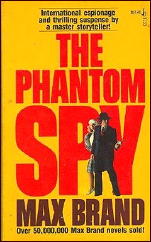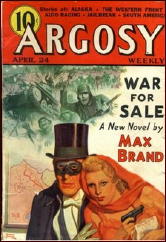Thu 9 May 2013
MAX BRAND – The Phantom Spy. Pocket, reprint paperback, December 1975. Dodd Mean, hardcover, 1973. First serialized in Argosy magazine, as “War for Sale,†April 24 to May 15, 1937.

They don’t write spy novels like this any more, and even when they did, I have a feeling that it was only Max Brand who wrote them. He had a highly romanticized view of the world, one in which friends were friends, lovers were lovers, and enemies were enemies, and even on occasion when there was some well-constructed confusion as to which was which, the reader always knew.
Lady Cecil de Winter is the early star of this one, a delightful young lady with a real feel for the game of espionage. Recruited by the British government in those days immediately prior to World War II to retrieve missing plans for the Maginot Line – a grand line of defense designed to protect France and Western Europe on the chance that war should break out — she recruits in turn a fellow named Willie Gloster, a cheerful, happy-go-lucky American who provides the help she needs, only to have her lose them again (the plans, that is) to the hands of a suave but evil mastermind by the name of von Emsdorf.

And the game is on. Not since reading the adventures of the early Saint have I read a tale of down to earth swashbuckling, without a single swash or buckle in sight. There is, of course, a phantom spy, a chap named Jacquelin, whom Lady Cecil believes to be another fellow named Cailland. We know better, and we groan in despair when she leaves the love of her life, Willie Gloster, who comes to her aid again anyway.
There is blood, there is danger, and there is one hell of a grand impersonation, and there is more. This is the real stuff, but written well before we know how far Hitler would go and how the war would really be waged. Max Brand, who of course is much better known for his westerns, was well aware of what causes countries to wage war with one another, but only close to the end of this book does he let the details intrude, and truth be told, I’d’ve rather he hadn’t.
This is very much of a period piece, if you haven’t gathered that already, but as I suggested at the beginning, perhaps it was even at the time it was written.
May 9th, 2013 at 7:21 am
Max Brand! After all these years I still have mixed feelings about his fiction. What I really miss are all the guys who used to collect his work. There are still a few around like the infamous Bedford-Jones expert, Digges La Touche. But for the most part they are all gone.
Steve probably remembers some of the old time Max Brand collectors like Harry Noble, Darrell Richardson, Jim Archambault, Mike Fogaris, and others too numerous to name.
They are almost all gone now, though I did recently sell 26 WESTERN STORY pulps with Max Brand stories to a collector in the mid-west. He used to dominate the western paperback sections in the bookstores.
May 13th, 2013 at 3:59 pm
This is one of the better Max Brand stories.The whole idea is completely unbelievable but Brand carries you along with him.Rather like Robert E.Howard but without the bloody fights.Brand always wrote in his own world.Steve is right about the romantic period piece aspects of the book.John Le Carre would have a fit.Still, the book is really a lot of fun.